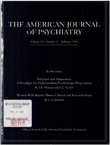Peritraumatic dissociation and posttraumatic stress in male Vietnam theater veterans
Abstract
OBJECTIVE: The aim of this study was to determine the reliability and validity of a proposed measure of peritraumatic dissociation and, as part of that effort, to determine the relationship between dissociative experiences during disturbing combat trauma and the subsequent development of posttraumatic stress disorder (PTSD). METHOD: A total of 251 male Vietnam theater veterans from the Clinical Examination Component of the National Vietnam Veterans Readjustment Study were examined to determine the relationship of war zone stress exposure, retrospective reports of dissociation during the most disturbing combat trauma events, and general dissociative tendencies with PTSD case determination. RESULTS: The total score on the Peritraumatic Dissociation Experiences Questionnaire--Rater Version was strongly associated with level of posttraumatic stress symptoms, level of stress exposure, and general dissociative tendencies and weakly associated with general psychopathology scales from the MMPI-2. Logistic regression analyses supported the incremental value of dissociation during trauma, over and above the contributions of level of war zone stress exposure and general dissociative tendencies, in accounting for PTSD case determination. CONCLUSIONS: These results provide support for the reliability and validity of the Peritraumatic Dissociation Experiences Questionnaire--Rater Version and for a trauma-dissociation linkage hypothesis: the greater the dissociation during traumatic stress exposure, the greater the likelihood of meeting criteria for current PTSD.
Access content
To read the fulltext, please use one of the options below to sign in or purchase access.- Personal login
- Institutional Login
- Sign in via OpenAthens
- Register for access
-
Please login/register if you wish to pair your device and check access availability.
Not a subscriber?
PsychiatryOnline subscription options offer access to the DSM-5 library, books, journals, CME, and patient resources. This all-in-one virtual library provides psychiatrists and mental health professionals with key resources for diagnosis, treatment, research, and professional development.
Need more help? PsychiatryOnline Customer Service may be reached by emailing [email protected] or by calling 800-368-5777 (in the U.S.) or 703-907-7322 (outside the U.S.).



